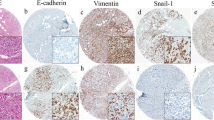Abstract
DEDD, a member of a family of death effector domain-containing proteins, plays crucial roles in mediating apoptosis, regulating cell cycle, and inhibiting cell mitosis. Our recent work demonstrates that DEDD is a novel tumor repressor, which impedes metastasis by reversing the epithelial–mesenchymal transition (EMT) process in breast and colon cancers. DEDD expression therefore may represent a prognostic marker and potential therapeutic target for the prevention and treatment of cancer metastasis. To reveal the anti-metastatic roles of DEDD in these cancer cells, a number of experiments, including immunohistochemistry, the establishment of stably overexpressing or silencing cancer cells, chemoinvasion assay, soft agar assay, protein degradation, and protein–protein interaction were used in our in vitro and in vivo studies. This chapter focuses on the details of these experiments to provide references for the researchers to investigate the function of a gene in the regulation of tumor metastasis.
Access this chapter
Tax calculation will be finalised at checkout
Purchases are for personal use only
Similar content being viewed by others
References
Valmiki MG, Ramos JW (2009) Death effector domain-containing proteins. Cell Mol Life Sci 66:814–830
Tibbetts MD, Zheng L, Lenardo MJ (2003) The death effector domain protein family: regulators of cellular homeostasis. Nat Immunol 4:404–409
Arai S, Miyake K, Voit R, Nemoto S, Wakeland EK, Grummt I et al (2007) Death-effector domain-containing protein DEDD is an inhibitor of mitotic Cdk1/cyclin B1. Proc Natl Acad Sci U S A 104:2289–2294
Xue JF, Hua F, Lv Q, Lin H, Wang ZY, Yan J et al (2010) DEDD negatively regulates transforming growth factor-beta1 signaling by interacting with Smad3. FEBS Lett 584:3028–3034
Lv Q, Wang W, Xue J, Hua F, Mu R, Lin H et al (2012) DEDD interacts with PI3KC3 to activate autophagy and attenuate epithelial-mesenchymal transition in human breast cancer. Cancer Res 72:3238–3250
Ledford H (2011) Cancer theory faces doubts. Nature 472:273
Thiery JP, Acloque H, Huang RY, Nieto MA (2009) Epithelial-mesenchymal transitions in development and disease. Cell 139:871–890
Reiman JM, Knutson KL, Radisky DC (2010) Immune promotion of epithelial-mesenchymal transition and generation of breast cancer stem cells. Cancer Res 70:3005–3008
Foubert E, De Craene B, Berx G (2010) Key signalling nodes in mammary gland development and cancer. The Snail1-Twist1 conspiracy in malignant breast cancer progression. Breast Cancer Res 12:206
Tran DD, Corsa CA, Biswas H, Aft R, Longmore GD (2011) Temporal and spatial cooperation of Snail1 and Twist1 during epithelial-mesenchymal transition predicts for human breast cancer recurrence. Mol Cancer Res 9:1644–1657
Peinado H, Olmeda D, Cano A (2007) Snail, Zeb and bHLH factors in tumour progression: an alliance against the epithelial phenotype? Nat Rev Cancer 7:415–428
Yang J, Mani SA, Donaher JL, Ramaswamy S, Itzykson RA, Come C et al (2004) Twist, a master regulator of morphogenesis, plays an essential role in tumor metastasis. Cell 117:927–939
Albini A, Benelli R (2007) The chemoinvasion assay: a method to assess tumor and endothelial cell invasion and its modulation. Nat Protoc 2:504–511
Mori S, Chang JT, Andrechek ER, Matsumura N, Baba T, Yao G et al (2009) Anchorage-independent cell growth signature identifies tumors with metastatic potential. Oncogene 28:2796–2805
Goldberg AL (2003) Protein degradation and protection against misfolded or damaged proteins. Nature 426:895–899
Nath D, Shadan S (2009) The ubiquitin system. Nature 458:421
Zhou BP, Deng J, Xia W, Xu J, Li YM, Gunduz M et al (2004) Dual regulation of snail by GSK-3[beta]-mediated phosphorylation in control of epithelial-mesenchymal transition. Nat Cell Biol 6:931–940
Demontis S, Rigo C, Piccinin S, Mizzau M, Sonego M, Fabris M et al (2005) Twist is substrate for caspase cleavage and proteasome-mediated degradation. Cell Death Differ 13:335–345
Yang Z, Klionsky DJ (2009) An overview of the molecular mechanism of autophagy. Curr Top Microbiol Immunol 335:1–32
Miller J, Stagljar I (2004) Using the yeast two-hybrid system to identify interacting proteins. Methods Mol Biol 261:247–262
Author information
Authors and Affiliations
Corresponding author
Editor information
Editors and Affiliations
Rights and permissions
Copyright information
© 2014 Springer Science+Business Media New York
About this protocol
Cite this protocol
Lv, Q., Hua, F., Hu, ZW. (2014). Use of the Tumor Repressor DEDD as a Prognostic Marker of Cancer Metastasis. In: Robles-Flores, M. (eds) Cancer Cell Signaling. Methods in Molecular Biology, vol 1165. Humana Press, New York, NY. https://doi.org/10.1007/978-1-4939-0856-1_14
Download citation
DOI: https://doi.org/10.1007/978-1-4939-0856-1_14
Published:
Publisher Name: Humana Press, New York, NY
Print ISBN: 978-1-4939-0855-4
Online ISBN: 978-1-4939-0856-1
eBook Packages: Springer Protocols




